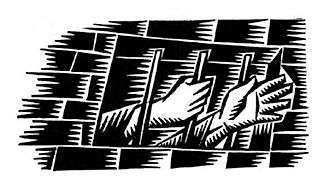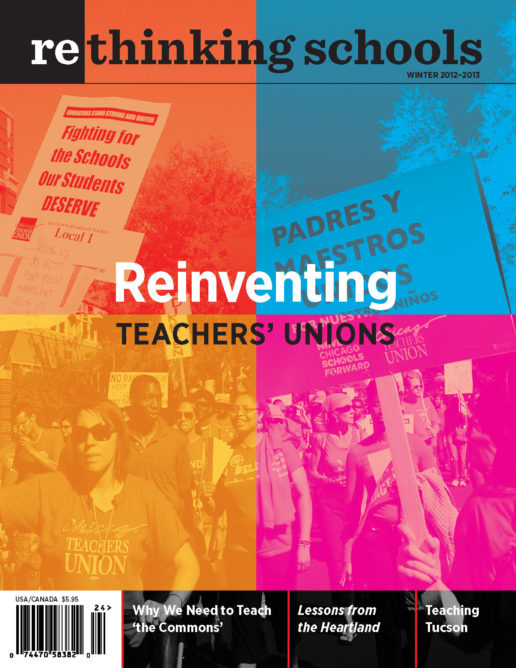Short Stuff 27.2
Illustrator: Radical Graphics

SCHOOL-TO-PRISON PIPELINE IN MISSISSIPPI
The U.S. Department of Justice (DOJ) filed a lawsuit against Meridian, Mississippi, Oct. 24, 2012, arguing that the city’s juvenile justice system has operated a school-to-prison pipeline that shoves students out of school and into the criminal justice system, violating young people’s due process rights along the way.
In Meridian, when schools decide to discipline children, they call the police, who show up to arrest children as young as 10. Arrests, the DOJ says, happen automatically, regardless of whether the police officer knows exactly what kind of offense the child has committed or whether that offense is worthy of an arrest. The police department’s policy is to arrest all children referred to the agency.
Once those children are in the juvenile justice system, school-based infractions count as violation of their probation. They are denied basic constitutional rights: handcuffed and incarcerated for days without any hearing and subsequently warehoused without understanding their alleged probation violations. Meridian’s years of systemic abuse punish youth “so arbitrarily and severely as to shock the conscience,” the complaint reads.
The DOJ action is based on years of research by organizations including the Southern Poverty Law Center (SPLC), whose inquiry into Meridian began in 2008, when attorneys started hearing reports of “horrific abuse” of youth housed in juvenile detention centers, said Jody Owens, managing attorney of the SPLC’s juvenile justice initiative in Mississippi. Advocates learned that 67 percent of youth in detention centers arrived there from the Meridian school system. In between school and detention, students were denied access to counsel and due process, and many were never told why they were arrested. “The administrators were the judge, jury, and executioner,” Owens said.
Meridian, a city of 40,000 people, is 61 percent African American. But over a five-year period, Owens said, “There was never once a white kid that was expelled or suspended for the same offense that kids of color were suspended for.”
“We talk about the school-to-prison pipeline and it’s often an abstract thing,” said Shakti Belway, an attorney who worked closely with families on the Meridian case. “But here it is literally happening over ridiculous, minor charges.” One middle school student was incarcerated up to 30 times for offenses including wearing the wrong color socks and being late to class. The DOJ, in its complaint, charged the city’s police department with operating a de facto “taxi service” shuttling students away from school and into youth jails.
Excerpted from “The Shocking Details of a Mississippi School-to-Prison Pipeline,” by Julianne Hing, Colorlines, Nov. 26, 2012. colorlines.com
MAJOR VICTORIES FOR MAPLE SPRING
Quebec students, working in collaboration with environmental activists and trade unions, won major victories this fall: A proposed 82 percent tuition fee increase was canceled and Bill 78, repressive emergency legislation enacted to end the months-long student strike, will be repealed.
The general strike—supported at its height by 300,000 students across Quebec and lasting from February until September—was spearheaded by the Coalition Large de l’Association pour une Solidarité Syndicale Étudiante (CLASSE), in coordination with the major student unions. Committed to direct democracy, students met regularly on each campus to decide whether to continue the strike and to discuss strategy and goals.
To counter the Liberal government’s branding of college students as privileged and in opposition to workers, CLASSE organized demonstrations in support of striking workers and built ties with trade unions. The student movement also allied itself with the environmental movement, joining major protests against plans to exploit natural resources in northern Quebec.
To stop the strike, the government passed Bill 78, which outlawed demonstrations of more than 50 people without police approval, made student strikes illegal, and suspended the rest of the university semester. But the effort backfired. A half-million people showed up to protest, and a wave of nightly “casserole” marches swept through Quebec as neighbors took to the streets, banging on pots and pans.
The Liberal government fell in September elections, and the new premier, Pauline Marois of the Parti Québécois, announced not only the student victories but major environmental victories as well: the closing of Quebec’s only nuclear reactor, the cancellation of a government loan to reopen Quebec’s last asbestos mine, and an end to shale gas exploration and development (i.e., fracking) in Quebec.
Based on reporting by Richard Seymour and Richard Fidler.

